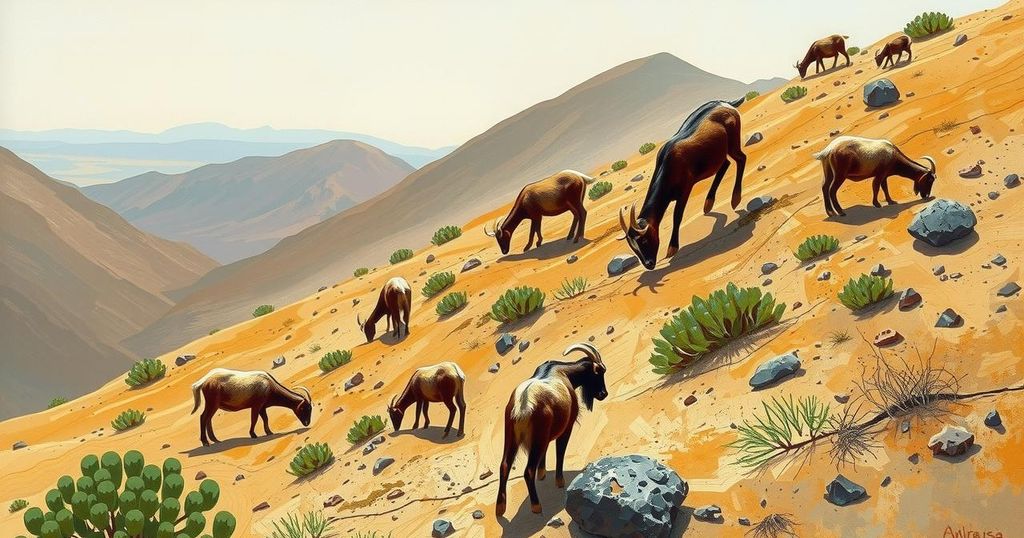Chilean Women’s Goat Herding Tradition: Resilience Amid Climate Change Challenges
Women goat herders in Ovalle, Chile, are adapting to climate change through award-winning cheese production amidst prolonged drought conditions. Their traditional practices are evolving as they face dwindling water resources, prompting innovations in goat husbandry. This resilience reflects both a commitment to heritage and the drive to thrive in a changing environment while gaining recognition in global markets.
In northern Chile, women goat herders are adapting their practices to confront the impacts of climate change, particularly severe drought. Since the introduction of goat herding in 1544, these women have pioneered award-winning cheese production, enhancing their products’ quality amid dwindling resources. International recognition has motivated these herders to innovate despite the hardships posed by a protracted dry spell that severely affects water availability and livestock nutrition.
The region experienced only 89.2 millimeters of rainfall in 2024, a figure slightly improved from the previous year. Despite this, the Limarí River reservoir’s capacity remains critically low at 15 percent. Consequently, many herders have altered their traditional practices, opting for stable or semi-stable goat raising, which allows for better management of their herds, although this method deviates from customary norms of itinerant grazing.
Yasna Molina, a prominent herder, shared insights into the hardships faced due to drought. Her award-winning blue cheese, Anqas, exemplifies her adaptation strategies as she supplements her goats’ diets with commercial feed while maintaining fidelity to traditional practices. Notably, she highlights the adaptability of the Criollo goat breed, which is economically advantageous in the context of declining water resources.
Migration has become a troubling consequence of climate change, forcing some herders further inland to find better grazing areas. Manuel Portilla recounted his experiences relocating his considerable herd, facing adversity along the way. The struggle for survival amid decreasing water availability is underscored by the broader trends of climate change, impacting all herders, regardless of their operational scale.
Claudia Torres, an agronomist, pointed out that small-scale herders are the most vulnerable, as they often lack the resources to adapt adequately. She articulated concerns regarding governance and resource management, emphasizing that a lack of strategic planning for watershed management exacerbates the plight of traditional herders, whose practices are often overlooked in favor of industrial agricultural interests.
The impact of climate challenges is compounded by the increased recognition of the distinct qualities of their products, which motivates local herders to innovate. Women like Elsa Araya have utilized state support to improve their irrigation systems, showcasing resilience amid adversity. Juana Pérez Milla has expanded her cheese offerings, reflecting a growing demand for diverse flavors and quality in goat cheese.
As Chilean goat herders contend with climate change, the prospects of international markets for their products are bright. The global goat cheese market is anticipated to grow significantly, with producers increasingly focusing on unique flavors to differentiate their offerings. Molina emphasized the importance of the concept of “terroir,” which embodies the essence of their land and practices and has the potential to garner designation of origin for their cheeses, thereby enhancing their global market position.
Despite the challenges faced, these herders continue to demonstrate resilience, finding creative solutions to overcome the effects of climate change and maintain their rich heritage. Through innovation and collaboration, they aspire to adapt sustainably while preserving the traditions that have defined their communities for centuries.
The plight and perseverance of women goat herders in Chile illustrates the broader impacts of climate change on agriculture. Through innovation and adaptation, these herders not only strive to maintain their traditions but also enhance their products, securing recognition in international markets. As they face the dual challenges of environmental pressures and market demands, the potential for designations of origin could further elevate their products, fostering a sustainable future for their heritage and livelihoods.
Original Source: www.globalissues.org




Post Comment